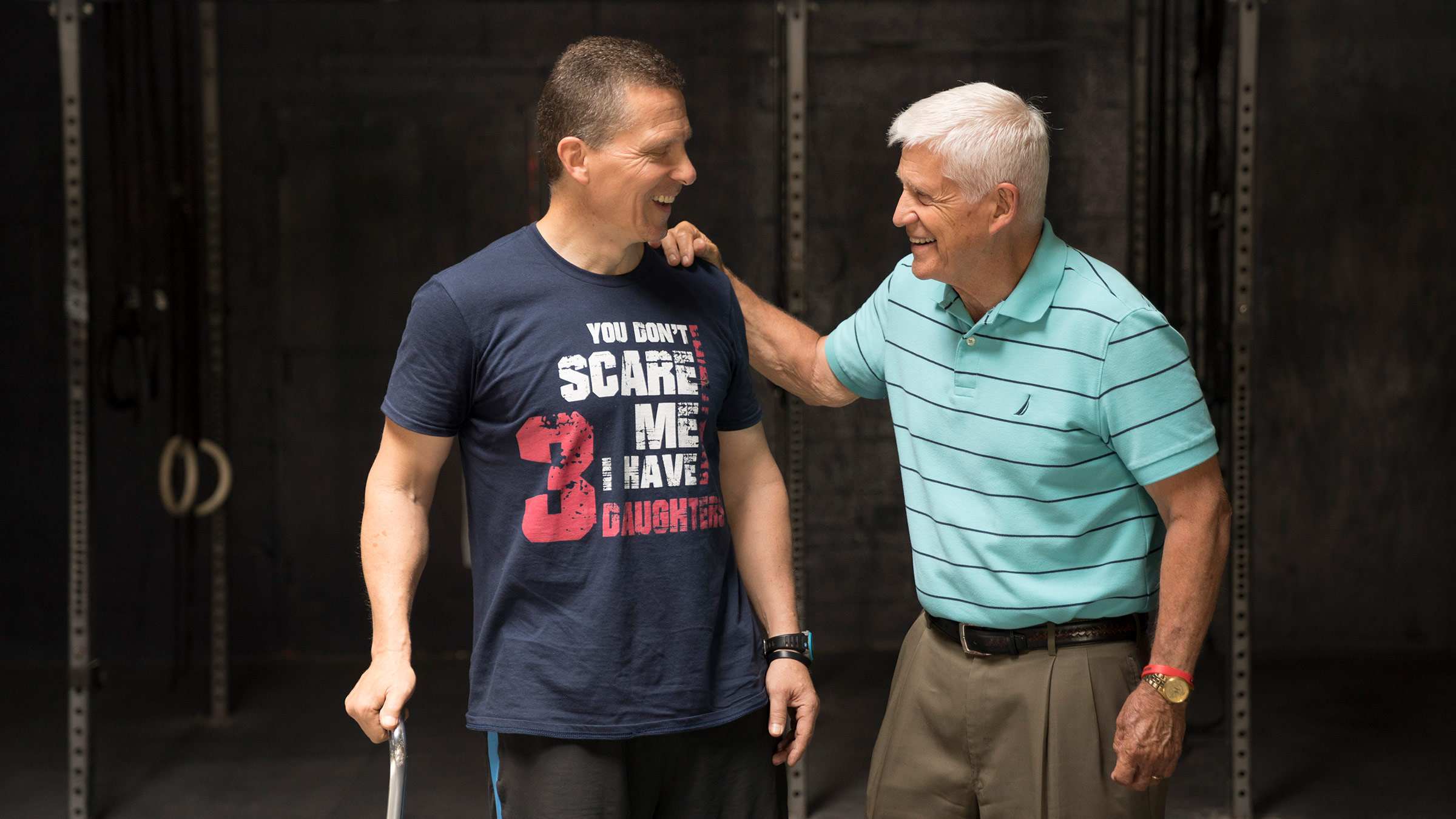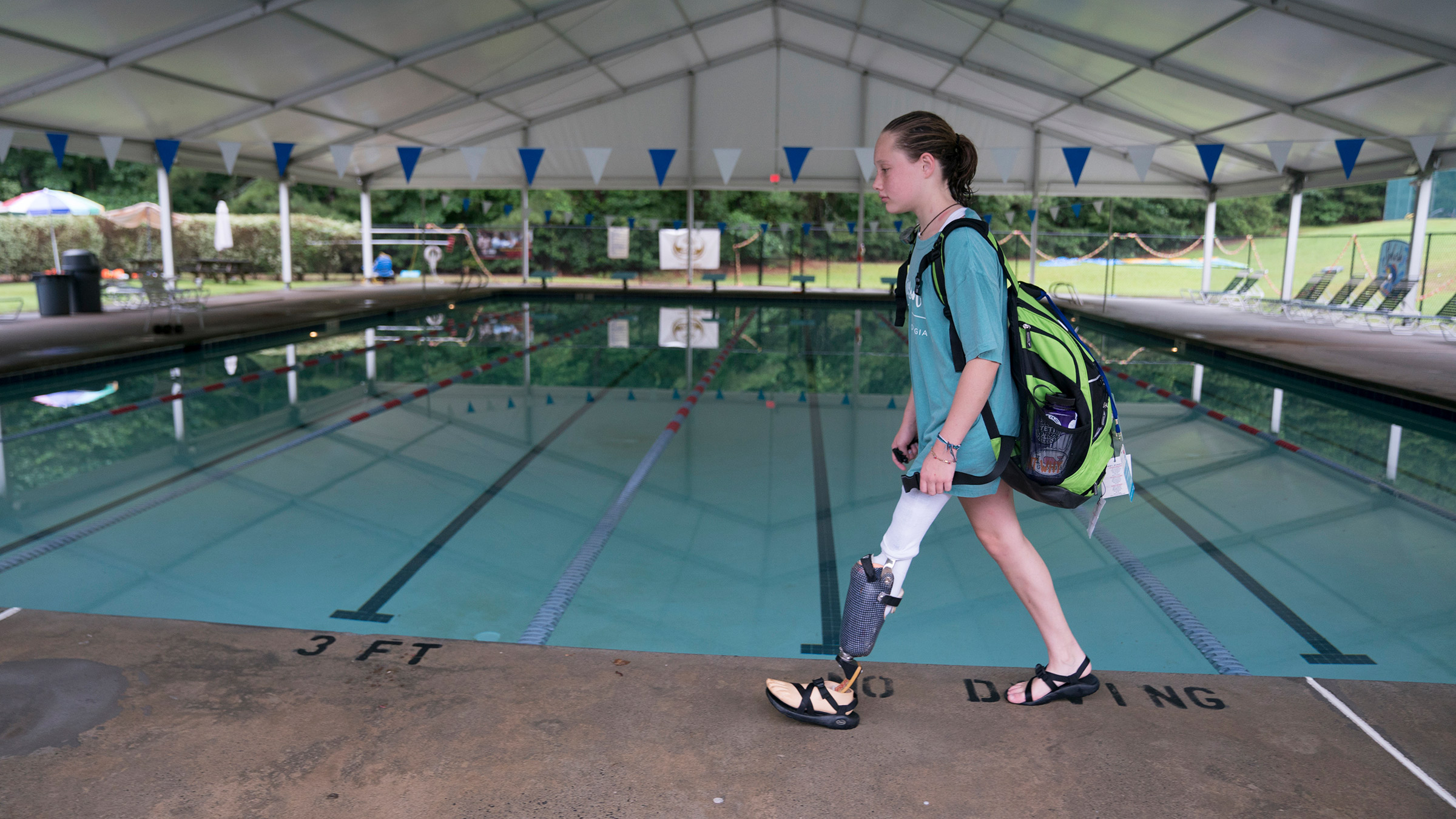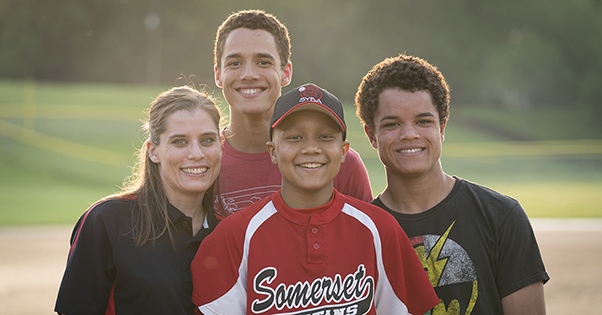Caregivers Talk About Struggles and Gifts of the Heart

Patricia McMorrow | 11.01.17
Six months after Tanya Bailey’s throat cancer diagnosis, the St. Paul, MN, resident was done with treatment. Her chemo port and feeding tube were gone, she had an “all-clear” PET scan, and had returned to work and graduate-school studies.
Life was good again. Of course, families who have been through serious health crises often have before-and-after definitions of “good.”
But Tanya’s husband and primary caregiver, Peter, was struggling. He wrote on Tanya’s CaringBridge Journal in February 2017, “Now that the intense year of Tanya’s throat cancer, and my Mom’s lung cancer, are well-handled, and in the recent rear-view mirror, now is apparently the time for me to fall apart.”
So many caregivers know this feeling. But whether in the midst, or aftermath, of doing for loved ones what they can’t do for themselves, “falling apart” is usually as low on their to-do list as “taking care of yourself.”
We understand this at CaringBridge, where we have been seeing caregivers up close for two decades, during hundreds of thousands of health journeys.
CaringBridge was created for a caregiver
CaringBridge, in fact, was created for a caregiver trying to manage the unmanageable.
Darrin Swanson, of Somerset, WI, was running between hospitals to support his wife, JoAnn Hardegger, who was critically ill with pregnancy-related hypertension and HELLP syndrome, and their daughter, Brighid, born prematurely, on June 7, 1997.
Stressed and overwhelmed, Darrin needed help keeping everyone updated. So instead of making endless phone calls, Sona Mehring, our founder, launched a website to support the young family.
JoAnn recovered, but Baby Brighid’s health was so fragile that she lived only 9 days. On what would have been her 20th birthday, which was also the 20th anniversary of CaringBridge, her parents said the love and light that shone through on CaringBridge is their daughter’s legacy.
And while no one can take away the weight and worry of health crises, at CaringBridge we wish to shine love and light on every parent, spouse, sibling, adult child and dear friend who has become, or will become, family caregivers.
November: National Family Caregivers Month
To do this, in honor of National Family Caregivers Month, we teamed with National Geographic photographer and documentary filmmaker David McLain, and turned to the true experts … CaringBridge caregivers.
Knowing that 65% of CaringBridge websites are created on someone’s behalf, we asked people who have turned to CaringBridge through the years to reflect on the struggles, and gifts, of caregiving.
Some talked about how their lives turned on a dime—one minute they weren’t caregivers; the next minute they were. Others moved into the role more gradually.
In many cases, health re-stabilized for the patients being supported, even if things did not always return to the way they were. And sometimes, health could not be restored.

We found two things to be true
For everyone we talked with, we found two things to be true:
- Few people identified themselves as “caregivers.” Instead, we heard things like this: “I am Grace’s mom.” “Louie is my husband.” “Ashley is my friend.”
- Across the board, caregivers focused more on their loved ones, and less on themselves.
But asked to share what they have learned, with the hope of helping others, CaringBridge caregivers were eager to share.
Some had practical advice: “Say ‘YES!’ to people who want to help you.” Others had gentle guidance for those who want be helpful: “Never say, ‘Oh, I could never be as strong as you are going through this.'”
One piece of advice from every story
Everyone had at least one thing they wanted others to know. Among the highlights:
- Bud Hart of Alexandria, VA, a primary caregiver for his adult son, Mike, living for five years with an undiagnosed, and debilitating, autoimmune disease, said, “You have got to quit pretending it’s going to all change tomorrow morning, and learn how to be where you are, how you are, right now. I don’t deal with that as well as I ought to, but the best way I can think of to keep patience in the middle of everything is a sense of humor and some spiritual stuff. That’s what makes the biggest difference.”
- Peter Bailey of Minnesota, who bravely admitted that he needed to re-group after taking care of his wife, Tanya, through treatment for squamous cell carcinoma of the tonsil, lymph and base of her tongue, said, “Like airplane passengers, let’s not forget to put on our own oxygen masks first … we are no good to our loved ones if we collapse under the strain.”

- Vicki Bunke of Marietta, GA, mom and caregiver to 14-year-old daughter, Grace, living with recurrent osteosarcoma, said: “Be kind to one another. Forgive one another. Just love each other, because it is going to be the hardest thing you have ever done. But in the end, you may find that it was the best experience.”
- Meritxell Mondejar Pont, a Minneapolis resident and Barcelona native, who lost her husband to glioblastoma multiforme, the worst kind of brain cancer, at age 35, said, “I had friends saying, ‘Oh, I really wanted to call to see how you were doing, but I didn’t want to bother you.’ I thought, ‘Call me. Tell me a funny story. My day was horrible, but if you make me laugh, it gives me a little break.'”
- Amy Amundson of New Prague, MN, who was plunged into caregiving after her son, Kevin, attempted suicide in response to undiagnosed depression, said, “You can stress about things out of your control, or you can turn them over to God. When you release things because there is nothing you can do, you turn them over to someone who has a bigger plan and a bigger control than you.”
- Claire Schwab of Alexandria, VA, who lived at the bedside of her son, Teddy, in a hospital far from home, after he suffered a traumatic brain injury in a car accident, said, “Before Teddy’s accident, I kind of prided myself on being the go-to girl, or getting everything done or being self-sufficient. And I realized that really didn’t do anyone any favors. It stretched me too thin. There are so many people who want to help. They want to be a part of what you are going through. Say ‘yes’ to people who want to help you.”

- Molly Sturgis of Chaska, MN, a mom of two and the primary caregiver for her toddler son, Telly, through chemo, radiation and a bone marrow transplant for acute myeloid leukemia, said, “When you visit someone’s CaringBridge website, send Well Wishes. That’s huge. It cheers you on … you see that people are there with you, through the heartache.”
- Rachel Parsons of Minnesota, who walked beside her friend, Ashley, through breast cancer diagnosed at age 24, said, “I’ve learned that being burdened for somebody … it can really weigh on you. So I just chose not to do that. I chose to be broken for Ashley’s situation, but I also chose an attitude of joy. I decided to come alongside her, and have fun and have a blast and do fun things together. Just because she has cancer, doesn’t change who she is, at all.”
- Nancy Grams of Eagan, MN, has been a caregiver for most of her 46-year marriage to Louie, who lives with chronic illnesses, including Multiple System Atrophy, celiac, diabetes and daily kidney stones. A CaringBridge author since 2009, Louie is among our most prolific authors. Nancy said, “When Louie writes, he feels better. Through CaringBridge, he has an avenue to be able to talk, share, write … get out what’s burdening him. It could be good, bad or ugly. But it is something that he can do apart from me, so that it doesn’t put an undue, overwhelming at times, pressure on our marriage.”

Amy Beasley, mom, assistant coach and primary caregiver for her son, Andre, who has been through kidney cancer treatment twice.
- Of course, every caregiver and every situation they face is different, with unique challenges and obstacles. But the advice shared by Amy Beasley of Somerset, WI, is the common thread that ties all of the stories together. Amy is the mom of five sons, including 14-year-old Andre, for whom she has been a caregiver through two rounds of treatment for Wilms tumor, the most common type of kidney cancer in children.
Reflecting on the journey, Amy said, “So many people say, ‘Oh, I could never be as strong as you are going through this.’ But really, you’ve got no choice. And so you find a strength that you never knew you had, and I know everybody has it in them.”
Thank you for these insights into others’ experiences. We can’t be reminded too often how much support we can give to caregivers just by reaching out.
thanks
Thank you?
OMG that’s so sad.
My daughter in law is now at home in hospice care. She is 53. Her terrible journey began when she was diagnosed with inflammatory breast cancer in 2016. At that time, she was placed in a medical trial at Brigham and Women’s Hospital. After chemo and multiple surgeries and given the news she was cancer free. A month later, she fell in her home. When taken back to Brigham and Women’s, they discovered lesions in her spine and brain. She had emergency brain surgery in June remained in the hospital five months, at which time they were told her cancer was not responding to treatment and was basically sent home to die. She was on the Caring Bridge website documenting her experience. She is at home now, my son her primary care giver. Her only child, Michaela is at college in Tampa trying to continue her education. This has been a tragedy for that family. I worry about their wellbeing both mentally and financially. I worry about my sons health as well. He is alone trying to hold down a job, managing volunteers who stay with his wife during the day. I know we all have hidden strength but what does one do when it is sucked out of you. My son lives in Massachusetts while I live in Florida. I have health issues and am unable to go there to help. Positivity is a wonderful concept ut doesn’t work for everyone. Tragedy is tragedy and there is nothing positive about it.
Nice article keep on writing
Thank you
Wonderful advice! My wife is battling internal mastised melanoma at stage 4. We try to live as normal a life as we can and enjoy each day together. This site will be welcome avenue to express ourselves to others who may need the boost.
I am so sick of inspiring stories. As a caregiver of my husband with Alzheimer’s, I can see nothing inspiring or rosy. It doesn’t ring true to me. This isn’t life. It is life of no value to either of us. Further, I’d rather see the health monies spent on the early and middle ages of life.
Five minutes ago I responded to this email by outlining who I am and what I do. To that end, I offer three suggestions for caregivers which I use at presentations and book signings of The Dementia Dance: 1) If you are a caregiver for dementia patients, you MUST go here they are in THEIR minds. It is unnerving, but must be done. If they call you ‘Jim’ and your name is ‘Charlie’ you need to acknowledge ‘Charlie’ and move on to another subject. Because they have become someone else, YOU must become someone else when in their presence (then I gave examples of such behavior, 2) Keep a balance in your life; stay in touch with other family members, go out to eat, for heaven’s sake, even go to WalMart or Target for a few hours away from the painful day-to-day challenges, 3) Don’t go it alone! Ask for help; church staff, friends, neighbors, sometimes family. I say sometimes because family dynamics often make it impossible for the caregiver to deal with (again, I give examples). I look forward to hearing from you and letting me know how I can make a difference.
I read with interest the above stories and understand where they are coming from. I was a caregiver for my mom for two years after she was diagnosed with dementia. Against her wishes yet for her own safety and my peace of mind, I finally moved her–against her will, of course–to an assisted living facility. There, I watched, listened and learned about how to maneuver through dementia without losing my insanity. In fact, I wrote and published a book called The Dementia Dance outlining my many experiences during the time I cared for her. I have had over 300 book signings since my book came on the market, with rave reviews: Rosemary’s book is a roadmap for caregivers; Rosemary’s book is ‘perfect’; If I ever get dementia, I hope my kids read and follow Rosemary’s advice; Rosemary’s book is a ‘must read’. At a recent presentation and book signing at an Ohio medical college, students lined the hall to buy my book. Imagine my surprise! You can go onto the internet under my name and The Dementia Dance to learn of my authenticity. I would be honored to be part of this program. Caregiving is a passion of mine. When my son decided to become a police officer after graduating from The Ohio State University in criminology, I told him I was not crazy about his choice of career, to which he responded, “Get over it, Mom; it’s a calling”. I accepted that, because I think that being a caregiver is a ‘calling’. I look forward to received an email from you letting me know how I can help with this vital group: Caring Bridge. Have a good day. Rosemary Barkes, The Dementia Dance.
It has been almost a year since my 71 year old hubby was placed in a memory care only facility for dementia caused by Alzheimer’s. Dealing with no longer having him at home is more difficult than I expected. Now I see all the things I do not have the energy to do and the financial shock of his care hits hard. How can I just sit around? The word “guilt” is huge: Guilt of not being able to care for him at home, guilt of my body failing to stress-induced illness, guilt of going alone to events like church, guilt of having fun, guilt of enjoying time alone, guilt of working on projects alone, guilt of making decisions alone, guilt of reacting negatively to what seems to be just about everything, guilt over the lack of concentration to the point of avoiding things like Bible Studies or discussions….. guilt of having so many up and down “moods”. Why do I often regret that I said anything and respond to others in disagreement, no matter if I really do or not.
Am I struggling with depression? “No” Am I struggling with depression? “Of course!” It is one of those questions that often changes when someone is concerned enough to ask. That person is someone who is not going to tell me a lot of “you should”, or “you shouldn’t”. They are going to be okay with me feeling as I do, knowing that I am trying my best to stay human as I seem to do less and fall apart more.